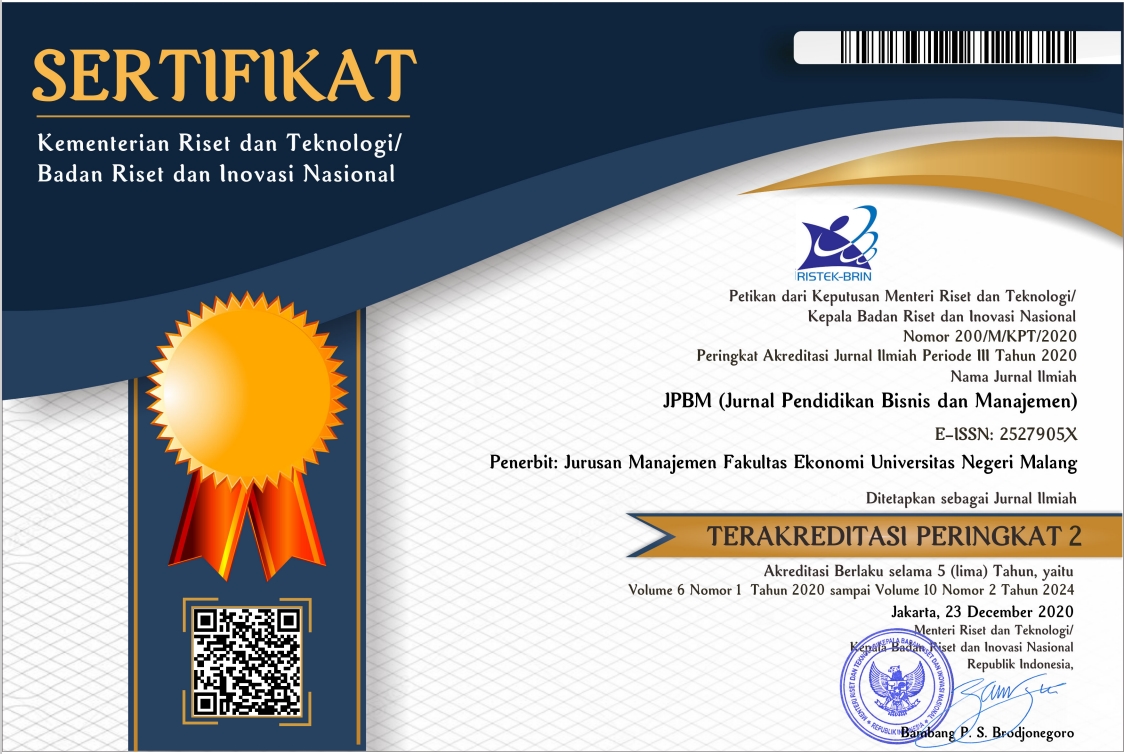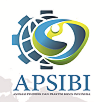The Learning of Business Principles Meaning Model Improve as an Effort to Enhance Active Interaction and Critical Thinking
Abstract
The purpose of this study is to provide business principles learning module which bases an improvement to enhance the students of Marketing Vocational High School. It was started by need analysis and ended by testing for the user. The findings of research showed that the module guides students to think critically in finding new concepts about learning materials. An active interaction among student and feedback, upgrading, and enrichment activity where students have a full role in learning activity also happened during lesson. Besides having expediency to be applied, the module creates meaningful learning for students.
Keywords
Full Text:
PDFReferences
Arini, S. 2015. Module Development Based on Saintifok Approach as Teaching Material for Bank Reconciliation Material Nurse. (Online) (Indonesian Origin)
National Education Standards Agency. 2016. 2014. Textbook Assessment Instrument. (Online), accesed on 16 Mei 2017 (Indonesian Origin)
Carter, A. G., Creedy, D. K., & Sidebotham, M. 2018. Critical Thinking in Midwifery Practice: Conceptual Model. Nurse Education in Practice, Nurse Education in Practice. Doi:10.1016/j.nepr.2018.09.006
Donas, E. 2016. Effect of Meaningful Learning on Integrated IPS Thematic Learning on Learning Outcomes of Class III Students at MI Ahliyah IV Palembang. PGMI Implication Journal, 2(1) 19-28
Herawati, S. 1999. Learning Biology with the STM Approach and Constructionvism Philosophy. Malang: Jurdik Biologi Fakultas MIPA (Indonesian Origin)
Ismail, N. S., Harun, J., Zakaria, M. A. Z. M., & Salleh, S. 2018. The Effect of Mobile Problem Learning Application DisScience PBL on Students’s Critical Thinking. Thinking Skill and Creatifity, 28,177-1
Mavarech, Z. R. & Kramarski, B. 1997. IMPROVE: A Multidimensional Method for Teaching Mathematics in Heterogeneous Classrooms. American Educationall Research Journal, 34(2), 365-394
Suryadi, D. 2001. The use of Indirect Learning approaches as well as the Direct and Indirect Combined Approach in order to improve the high-level mathematical thinking skills of junior high school students. UPI Mathematics Education Dissertation (Indonesian Origin)
Suryaningsih, N. S. 2010. Module Print Media Development as Independent Learning Media in Class VII Information and Communication Technology Class 1 at Jombang Junior High School 4, Thesis Summary.
Supardi, et al. 2011. Development of Learning Modules for Service Company Accounting Cycles. Tekno Pedagogi Journal, 1(2), 16-20.
BalıkcıoĿlu, G., & Efe, T., 2016. The Role of Metacognitive Activities on University Level Preparatory Class EFL Learners Reading Comprehension. Procedia - Social and Behavioral Sciences, International Conference on Teaching and Learning English as an Additional Language, GlobELT 2016, 14-17 April 2016, Antalya, Turkey 232, 294–299. https://doi.org/10.1016/j.sbspro.2016.10.024
Enke, J., Kraft, K., & Metternich, J. 2015. Competency-oriented Design of Learning Modules. Procedia CIRP, 5th Conference on Learning Factories 32, 7–12. https://doi.org/10.1016/j.procir.2015.02.211
Kostiainen, E., Ukskoski, T., Ruohotie-Lyhty, M., Kauppinen, M., Kainulainen, J., & Mäkinen, T. 2018. Meaningful learning in teacher education. Teaching and Teacher Education 71, 66–77. https://doi.org/10.1016/j.tate.2017.12.009
Reitsma, R., Marshall, B., & Zarske, M., 2010. Aspects of ‘relevance’ in the alignment of curriculum with educational standards. Information Processing & Management 46, 362–376. https://doi.org/10.1016/j.ipm.2009.08.006
Smith, T. E., Rama, P. S., & Helms, J. R. 2018. Teaching critical thinking in a GE class: A flipped model. Thinking Skills and Creativity 28, 73–83. https://doi.org/10.1016/j.tsc.2018.02.010
Thuneberg, H. M., Salmi, H.S., & Bogner, F.X. 2018. How creativity, autonomy and visual reasoning contribute to cognitive learning in a STEAM hands-on inquiry-based math module. Thinking Skills and Creativity 29, 153–160. https://doi.org/10.1016/j.tsc.2018.07.003
Weyns, T., Colpin, H., Engels, M.C., Doumen, S., & Verschueren, K., 2018. The relative contribution of peer acceptance and individual and class-level teacher–child interactions to kindergartners’ behavioral development. Early Childhood Research Quarterly 47, 259–270. https://doi.org/10.1016/j.ecresq.2018.12.009
Yunita, H. 2014. Module Development Based on Contextual Learning with Character Contents in Special Journal Materials. (online) (Indonesian Origin)
DOI: http://dx.doi.org/10.17977/um003V4i22018p053
Refbacks
- There are currently no refbacks.
JPBM (Jurnal Pendidikan dan Bisnis Manajemen) is licensed under a Creative Commons Attribution-NonCommercial-ShareAlike 4.0 International License.
JPBM (Jurnal Pendidikan dan Bisnis Manajemen) is abstracted and indexed in :

















